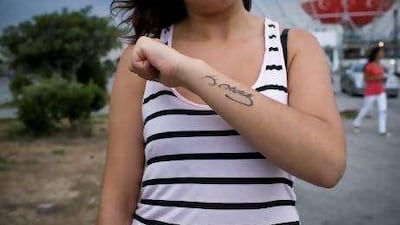ISTANBUL // The flourish of ink jumps out amid the crowds on the teeming Istiklal pedestrian street and on ferries making their rounds across the Bosphorus, the distinctive flow of the signature instantly recognisable.
With increasing frequency a tattoo of the signature "K. Ataturk" can be seen on the bodies of Turks, a show of support for the late Mustafa Kemal Ataturk, the founder of the modern Turkish republic and the symbol of the country's secular establishment. But as Turkey's Islamist government grows ever stronger and Ataturk's legacy appears to diminish, many secular Turks are becoming more vocal - and more visual - in their support of the late army general's legacy.
"This tattoo is getting more and more popular every day, especially among young people," said Murat Arti, a tattoo artist and the owner of Tattoo Murat in the Sisli district of Istanbul. "They think the government is trying to make them forget Ataturk. The government is even trying to change the constitution now." For devotees, Ataturk is seen as a symbol of progressiveness and modernisation, values that members of the country's opposition fear are under threat from the ruling Justice and Development Party (AKP), which has its roots in political Islam.
Over the past decade, the AKP has reformed the banking system and increased trade and other ties with the country's neighbours, transforming Turkey into one of the region's strongest economies. Yet many members of the opposition believe that the AKP's success is a cover for their long-term plan to consolidate power and possibly even turn the country into an Islamic republic. "Just like it happened in Iran," Mr Arti said. "They got rid of the shah and it became more religious and conservative. AKP is trying to do the same in Turkey."
From Izmir to Istanbul, tattoo parlours such as the one owned by Mr Arti do the tattoo free of charge or at a low price to make opposition to AKP more visible. Mr Arti does the tattoo free every April, his birthday month. This April, he said, 300 people requested the tattoo, by far the most he has done in the five years he has been offering it. The growing number of people requesting the Ataturk tattoo comes at a time of increased politicisation ahead of a referendum in September on controversial amendments to the constitution proposed by the AKP. The referendum is widely viewed as a litmus test for how the AKP will fare in the 2011 parliamentary elections and opposition parties are campaigning hard for a "No" vote.
Speaking to foreign journalists last week, Sadullah Ergin, the justice minister, referred to the reforms as "timid". Backed by the EU, the reforms are aimed at reining in the country's judiciary, which has in the past interfered in the decision-making process of the government. Opposition members believe they will give AKP too much power over the Constitutional Court and the supreme board of public prosecutors and judges and further the party's consolidation of power.
"Turkey is going down," said Cihan Demir, 21, who is planning to get the tattoo. "Ataturk was trying to make Turkey better than the old Turkey. Today, nationalism is up and terror is back. Religion is coming from the government." Opinion polls show that more Turks may share Mr Demir's view. According to a poll this month by the Istanbul-based research group Sonar Arastirma, the Republican People's Party (CHP), Turkey's main opposition party, had pulled ahead of the AKP, one of the first times it has done so since AKP was re-elected in 2007. According to the results, 33.5 per cent of respondents said they would vote CHP while 31.1 per cent said they would vote AKP.
Yet even as the CHP's new leader, Kemal Kilicdaroglu, goes from city to city campaigning for a "No" vote, the result of next month's referendum is far from decided. "The result is not certain yet," said Ayhan Kaya, a professor of international relations at Istanbul's Bilgi University. "People are undecided at the moment. The referendum is turning out to be a kind of test for AKP." Daniel Garcia, the owner of Inkstanbul Tattoo shop, offers free Ataturk tattoos every November 10, the date Ataturk died and the day he is traditionally remembered. His three tattoo artists have to work all day to accommodate the number of customers.
Mr Garcia, whose mother is Turkish and father Spanish, said the signature the tattoo is based on comes from the document Ataturk signed to abolish the old Ottoman alphabet and start using an alphabet based on the Latin script, a sign of Turkey's desire to share a European mindset. "Sixty per cent of the people that get the tattoo don't have any others," he said. "They don't usually like tattoos, but they like this sign so it has to be small and it has to be somewhere special."
Most people request the tattoo on their arm or hand. Others prefer it over their heart. "You know we have two types of people here in Turkey," Mr Garcia said. "The people that adore Ataturk and the ones that adore fundamentalism. I think it's a great tattoo for anyone that wants to give a message." @Email:foreign.desk@thenational.ae

